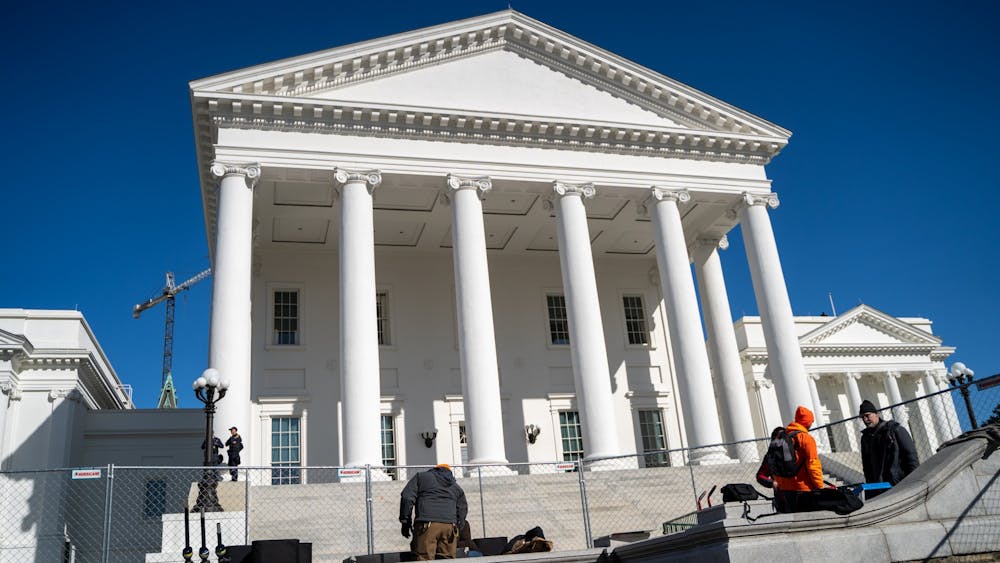The five Democratic candidates for Virginia governor discussed police reform, infrastructure and economic development in a debate held Thursday night in Bristol.
Some candidates directly called out former Gov. Terry McAuliffe over his record, which he frequently cited throughout the evening.
In addition to McAuliffe’s continued lead in fundraising, a poll conducted last month by Christopher Newport University’s Wason Center found that 47% of the state’s Democratic voters surveyed supported McAuliffe.
Lt. Gov. Justin Fairfax polled 8% of support, state Sen. Jennifer McClellan, D-Richmond, with 6%, Jennifer Carroll Foy, a former delegate, with 5% and Del. Lee Carter, D-Manassas, a self-described socialist, with 1%.
When asked about reducing poverty in regions such as southwest Virginia and Southside, Carter and Foy referred to past leadership.
Carter called out the other four candidates on stage for their support of a deal with Amazon in which the state offered incentives so the company would build its second headquarters in Virginia. Carter was the only candidate who would stop corporate handouts, he said, and called for money to go to people in local communities and more community-owned jobs.
The site is expected to bring 25,000 jobs paying an average of $150,000 a year, which would lift up families, McAuliffe responded.
In one of her criticisms of McAuliffe, Foy said McAuliffe had left communities behind, including her hometown, Petersburg. Foy touted her union endorsements and experience as a public defender as evidence that she would serve underprivileged communities.
When McAuliffe mentioned Petersburg as an example of his success and said that all of the town’s schools were accredited by the end of his tenure, Foy pointed out that only one school in Petersburg is accredited. One school in Petersburg is fully accredited, and four others are accredited with conditions, according to the Virginia Department of Education.
“I know that when Petersburg, Virginia, was fallen on hard times -- financial insecurity -- that the community asked for help from Governor Terry McAuliffe, and he chose inaction of a predominantly African American community that needed the former governor, and he didn't show up,” Foy said.
Foy said McAuliffe chose inaction and sided with law enforcement during his time in the governor’s mansion, referring to a former statement McAuliffe made while he served in office.
All candidates indicated that they were against qualified immunity when asked; however, McAuliffe was less straightforward with his answer, calling for required body cameras on police officers.
Enjoy what you're reading?
Signup for our newsletter
McAuliffe also sought to clarify the statement Foy referenced earlier, saying that he had been speaking about license plate readers at the time.
McAuliffe referenced his time as governor throughout the evening, including the infrastructure spending and initiatives such as “Breakfast After the Bell,” a program that provides more meals to children in school.
When the candidates were asked about how they would deal with issues posed by abandoned coal mines, the former governor said he would approach the issue in the same manner in which he handled coal ash while serving as governor.
McAuliffe said the progress made in the past eight years was threatened by the possibility of a Republican governor. Republican candidates are trying to bring Trump politics and must be stopped, he said.
“I am the only person in 44 years that has broken the curse; whoever wins the White House, the other party was the governor's mansion,” he said. McAuliffe also referenced his broad coalition of support from lawmakers within the General Assembly and Black Caucus.
Fairfax has been accused by two women of sexual assault. Though the accusations went unmentioned Thursday night, Fairfax did address them at the last debate on April 6.
Fairfax promoted accomplishments of the Northam administration during the debate. Gov. Ralph Northam endorsed McAuliffe last month. Fairfax emphasized his hope to transform education across the state, mentioning a goal to rebuild all school buildings in the state older than 40 years.
McClellan spoke about her accomplishments during her 15 years in the General Assembly, including sponsoring legislation regarding the protection of workers’ rights, increased access to abortion and voting rights.
Her record, combined with her new perspective, would help her get things done, she said. When speaking about police reform, McClellan talked about her personal experiences, such as a discussion with her son and experience with an intern centered around fear of the police.
If McClellan or Foy were elected, they would be the state’s first Black woman to serve in the position.
Carter stood out from the other candidates and alluded to having a different background than “normal” for politicians in his closing statement.
Although all of the candidates called for reform of policing and many said drug addiction should not lead to incarceration, Carter spoke of his work for marijuana legalization and called for the legalization of other drugs.
Other points of agreement among the candidates were banning transgender students from participating on sports teams corresponding with their gender identities, which they all indicated that they would not, and abortion access.
Contact City & State editor Eileen Pomeroy at eileen.pomeroy@richmond.edu.
Support independent student media
You can make a tax-deductible donation by clicking the button below, which takes you to our secure PayPal account. The page is set up to receive contributions in whatever amount you designate. We look forward to using the money we raise to further our mission of providing honest and accurate information to students, faculty, staff, alumni and others in the general public.
Donate Now

